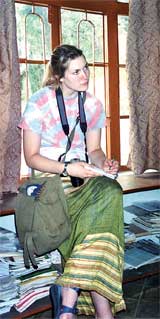Two women serve as student’s mentors

Jessica Koch studies the Tibetan peace process by examining the children´s villages in the region and how they aid the process.
The etymology of the word upon which this article shall focus is perhaps as revelatory as the article itself attempts to be.
The modern mentor, defined by Webster’s dictionary as “a trusted counselor or guide,” is traced to Homer’s Odyssey, a fact to which I was unaware prior to the conception of this piece. In the great epic, hero Odysseus leaves his trusted ally Mentor to watch over his household in his absence. And here is where the story gets interesting: in an effort to counsel Odysseus and son Telemachus, goddess Athena assumes the form of Mentor, and as a result becomes their guide.
Evidence here indicates the very first mentor, in fact the very character that defined the concept, was a woman. And to the fact that women are today still the definition of mentor, I will attest.
To risk sounding trite, I must assert I could not and would not have attained the goals I have thus far realized without the assistance of my mentors.
It seems no great coincidence to me these mentors have happened to be women, and furthermore, considering mentor comes from the Indo-European root men, meaning “to think,” I am considerably less surprised these women have happened to be extraordinarily intelligent.
For the experience that shall be detailed herein, I am forever indebted to two mentors, two powerful and beautiful women, to whom I must attempt to express my appreciation, though words may do it no justice.
To Dr. Carolyn Hale and Ms. Margaret McCaleb: your lives have provided example, your actions have inspired, and your words have guided.
You have acted as mentor to those who have come before me and those who have still yet to come.
For everyone whose life you’ve touched, I thank you.
Your donation will support the student journalists of Missouri Southern State University. Your contribution will allow us to purchase equipment and cover our annual website hosting costs.















